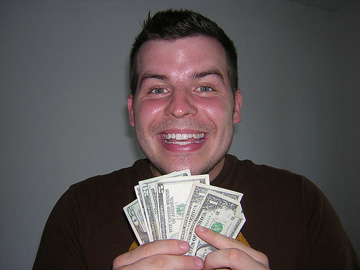Does money buy happiness?

If you’re like me, you feel moral compulsion to say “No, money does not buy happiness.” Yet, if you’re like me, you secretly believe that there is some kind of connection between financial resources and emotional well-being. You can remember times when you spent money and the result was happiness. But you probably don’t want to admit this in public.
A recent column in the New York Times explores surprising connections between money and happiness. In “Don’t Indulge. Be Happy,” authors Elizabeth Dunn (assoc. prof. of psychology, University of British Columbia) and Michael Norton (assoc. prof. of business admin., Harvard Business School) begin by acknowledging our cultural inclination to associate more money with more happiness. They also recognize our tendency to minimize the relationship of money and happiness. So what are the facts?
It turns out that those who make $75,000 a year have what they need to be happy in our society.
The catch is that additional income doesn’t buy us any additional happiness on a typical day once we reach that comfortable standard. The magic number that defines this “comfortable standard” varies across individuals and countries, but in the United States, it seems to fall somewhere around $75,000. Using Gallup data collected from almost half a million Americans, researchers at Princeton found that higher household incomes were associated with better moods on a daily basis — but the beneficial effects of money tapered off entirely after the $75,000 mark.
Moreover, the money we make over a certain baseline contributes relatively little to our overall happiness:
In research we conducted with a national sample of Americans, people thought that their life satisfaction would double if they made $55,000 instead of $25,000: more than twice as much money, twice as much happiness. But our data showed that people who earned $55,000 were just 9 percent more satisfied than those making $25,000. Nine percent beats zero percent, but it’s still kind of a letdown when you were expecting a 100 percent return.
Dunn and Norton go on to explain that spending money on ourselves is not nearly as productive of happiness as we might suppose. “We usually think of having more money as allowing us to buy more and more of the stuff we like for ourselves, from bigger houses to fancier cars to better wine to more finely pixilated televisions. But these typical spending tendencies — buying more, and buying for ourselves — are ineffective at turning money into happiness.”
Moreover, the more we spend on ourselves, the more we indulge and overindulge, the less we enjoy that which we think will give us happiness. Dunn and Norton suggest, ironically, that New York mayor Michael Bloomberg’s proposal to ban giant sodas might actually increase the pleasure of soda drinkers. Go figure!
Finally, Dunn and Norton argue that one of the best ways to produce happiness through spending money is by spending it on others: “And in countries from Canada to India to South Africa, we find that people are happier when they spend money on others rather than on themselves.” By indulging ourselves less and giving generously, we actually increase our happiness, not to mention the well-being of others.
So, does money buy happiness? Perhaps it does, if you give it away.












